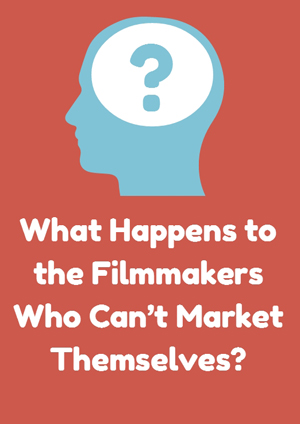Need some inspiration? A kick in the pants? Did the piece you worked so hard on not turn out so great?
We all go through this. There is a solution.
Month: February 2014
By Reid Rosefelt
 Making a great movie is hard. Marketing a movie might be even harder. There are many good movies every year, but there are far fewer well-marketed ones. The list of people (and studios) who market films successfully year after year is a very elite club.
Making a great movie is hard. Marketing a movie might be even harder. There are many good movies every year, but there are far fewer well-marketed ones. The list of people (and studios) who market films successfully year after year is a very elite club.
When I began working as a publicist, most American filmmakers weren’t expected to be able to promote his or her own work. Nowadays every filmmaker is expected to be able to shoulder that burden.
How scary this must be for filmmakers.
By Alexia Anastasio
In January, 2014, The Wrap’s Tim Molloy asked a panel including Lena Dunham, HBO’s Girls executive producers Jenni Konner and Judd Apatow why there was so much nudity on the show. Yes, 2014.
“It’s because it’s a realistic expression of what it’s like to be alive,” explained Dunham. For many indie filmmakers, especially females who also star in their projects, it can be a trap.
While it may seem bizarre to keep having this conversation of why nudity is used, we should really be talking about when nudity is used and how it can be an effective storytelling tool.
As a director or producer, you need to be able to understand how your actors think. As a director, it doesn’t hurt to know how your producer thinks either, so you might want to read this blog. Both directors and producers, need to know how their crew thinks. And these days all should know how investors and distributors think, and those involved in the infrastructure elsewhere, like agents. Then there is the audience; let’s check that box too. Heck we need to know about critics too. And Festivals. The list never ends!
So where do we begin?
Fortunately for us, ActorsAndCrew.com put together this nice list of their recommendations on the Top Ten Books on acting. Perhaps some one can put together the same on:
- Producing
- Crew: Casting Directors, Cinematographers, Editors, Production Assistants, Production Designers
- Film Financing Now
- Distribution
- Agents, Managers, Publicists
- Film Fans
- Festivals
- Critics
If we build these lists, I do think it will all get better, albeit not quite at the pace we may so desire.
By Lindsay Blair Goeldner

Previously: Sundance 2014 — a Microcosm of a Greater Divides
At Indie Street we are holding on to all hope that the interpersonal human elements of storytelling will never fade away into obsoleteness. The following piece comes from one of Indie Street’s own curators. While she is not programming a film festival or being one of the coolest computer programming chicks in the game, Lindsay finds time to work at one of the last Indie Video Rental Stores in Canada. Who better to get a street level breakdown about the effects of technology on film consumer’s behavior…Enjoy!
 The death of the indie video store is imminent. At least that’s what everyone tells me. Working as a video store clerk in one of a handful of stores (Queen Video) in Toronto is both a blessing and a burden. While the job remains interesting, I’m continually receiving remarks about how great it is that we’re still open. In the wake of the Blockbuster collapse, the independent video store flourished. Business seemed better than usual around late 2011 when the last Blockbusters were closing down in Canada. At that point in time, Netflix had already arrived, and streaming was still popular, but for some reason many people did not want to let go of the video store experience.
The death of the indie video store is imminent. At least that’s what everyone tells me. Working as a video store clerk in one of a handful of stores (Queen Video) in Toronto is both a blessing and a burden. While the job remains interesting, I’m continually receiving remarks about how great it is that we’re still open. In the wake of the Blockbuster collapse, the independent video store flourished. Business seemed better than usual around late 2011 when the last Blockbusters were closing down in Canada. At that point in time, Netflix had already arrived, and streaming was still popular, but for some reason many people did not want to let go of the video store experience.
By Charles Peirce
 Strategy is a great personal passion, but something I find few people have an adequate grasp of. While the basic assumption seems to be that advice of all kinds is inherently strategic and of value, it is often anything but. Any given suggestion or piece of advice is only worthwhile inasmuch as it allows the attaining of a goal — without knowing that goal and measuring the success of attempts to attain it, you are not operating strategically: you are merely using tactics of unknown value.
Strategy is a great personal passion, but something I find few people have an adequate grasp of. While the basic assumption seems to be that advice of all kinds is inherently strategic and of value, it is often anything but. Any given suggestion or piece of advice is only worthwhile inasmuch as it allows the attaining of a goal — without knowing that goal and measuring the success of attempts to attain it, you are not operating strategically: you are merely using tactics of unknown value.
For awhile now, 99% of the films generated have essentially gone unseen. The film industry is finally waking up to this overall change.
Are we now prepared for the next step? And the appropriate one at that?


